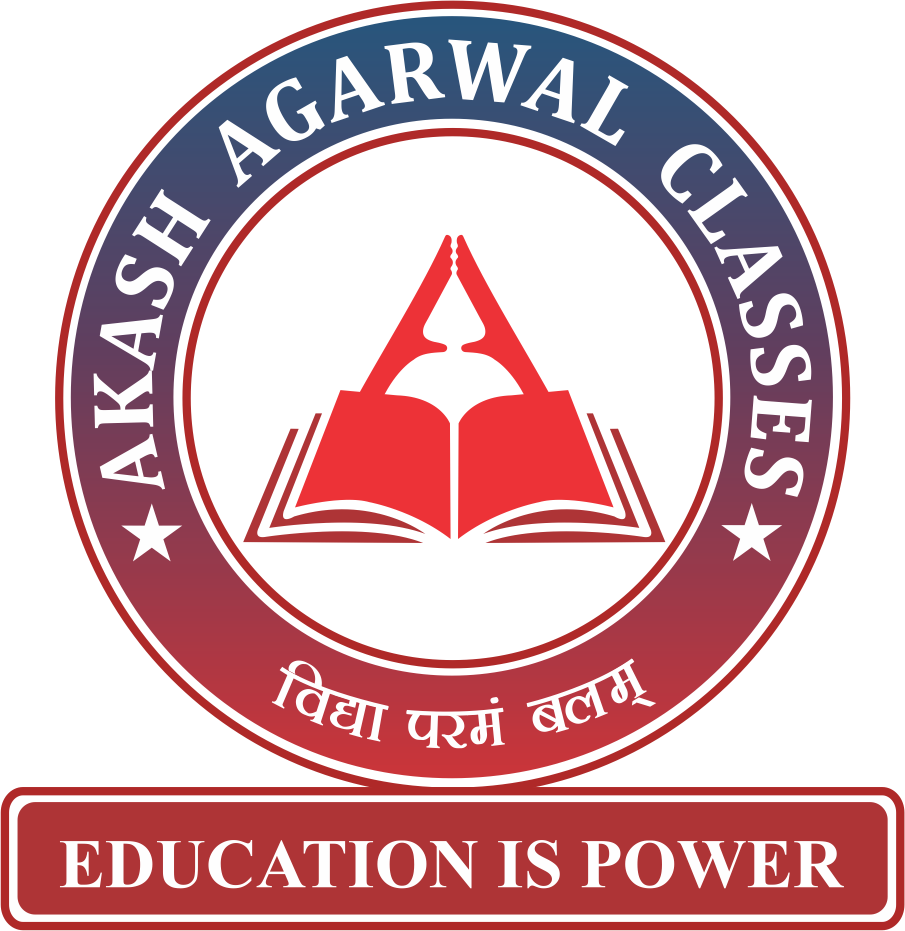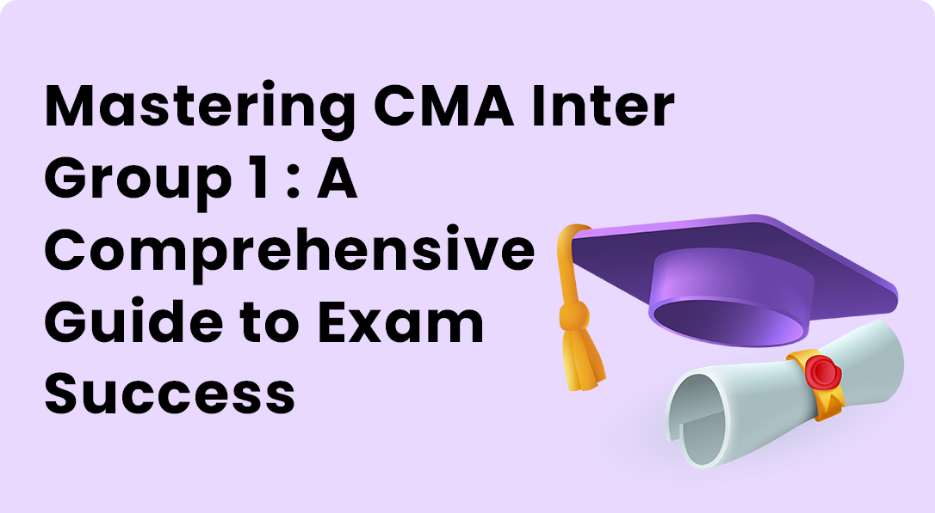Starting the difficult journey to become a Cost and Management Accountant (CMA) requires making it through three essential phases, the second of which is the CMA Intermediate. The Institute of Cost and Management Accountants of India (ICMAI) is in charge of this test, which is a prerequisite for earning the esteemed CMA credential. Specifically, mastering Group 1 of the CMA Inter test necessitates a calculated strategy and careful planning.
Group 1 includes the following four crucial papers:
- Paper-5 (Financial Accounting)
- Paper-6 (Laws and Ethics)
- Paper-7 (Direct Taxation)
- Paper-8 (Cost Accounting)
Each paper plays a vital role in assessing the candidate's knowledge and competence; let’s explore how to prepare for each of them:
Paper-5 (Financial Accounting): Mastering Financial Reporting and Analysis
To excel in Paper 5, candidates must delve into the intricacies of financial accounting, focusing on comprehensive financial reporting and analysis. Proficiency in understanding balance sheets, income statements, and cash flow statements is paramount. A solid foundation in accounting principles is crucial for tackling complex financial scenarios that may be presented in the examination. Regular practice and the application of theoretical knowledge to practical situations will enhance problem-solving skills and ensure confidence in approaching diverse financial scenarios.
Paper-6 (Laws and Ethics): Navigating Legal Frameworks and Ethical Considerations
The successful navigation of Paper 6 requires a comprehensive understanding of legal frameworks and ethical considerations in the business world. This involves embracing case studies to enhance problem-solving skills and grasping the legal nuances that govern corporate practices. The ability to integrate ethics into decision-making is essential for success in this segment. By immersing oneself in real-world scenarios and understanding the implications of legal and ethical decisions, candidates can effectively tackle the challenges presented in Paper 6.
Paper-7 (Direct Taxation): Mastering Tax Laws and Regulations
Mastering Paper 7 entails a meticulous study of tax laws and regulations, diving into income tax provisions, exemptions, and deductions. Candidates must actively engage with practical problems to reinforce theoretical knowledge. Given the dynamic nature of tax laws, staying updated with the latest amendments is essential. This ensures readiness for questions that assess the practical application of tax-related concepts. Successful candidates in this paper demonstrate not only theoretical proficiency but also an ability to apply tax knowledge to real-world scenarios.
Paper-8 (Cost Accounting): Excelling in Costing Methods and Analysis
Paper 8 focuses on cost accounting and demands a solid grasp of costing methods, budgeting, and variance analysis. Candidates should practice solving problems related to cost structures and decision-making. Conceptual clarity is crucial for approaching intricate problems with confidence. Regular revision is key to reinforcing the understanding of cost accounting principles and their practical applications. Successful candidates demonstrate not only a theoretical understanding but also an ability to apply cost accounting concepts to complex business scenarios.
Other Strategies for Success
Beyond mastering the specific papers, adopting overarching strategies enhances overall success in the CMA Inter Group 1 examination.
Efficient Allocation of Study Time
Efficiently allocate study time to cover all subjects. Prioritize areas that require more attention, ensuring a balanced preparation approach. Time management is crucial during the exam, and candidates should practice answering questions within specified time limits during their preparation.
Mock Tests and Revision
Regularly undertake mock tests to simulate exam conditions. Use feedback to identify weak areas for targeted revision, and consolidating knowledge. This practice not only helps in gauging one's preparedness but also aids in understanding the exam pattern and improving time management skills.
Engaging in Group Discussions and Study Groups
Engage in group discussions, online forums, or study groups to gain diverse perspectives. Explaining concepts to others reinforces understanding and provides an opportunity to learn from peers. Interactive learning fosters a collaborative approach to problem-solving and enhances overall comprehension.
Balancing Well-being for Cognitive Function
Maintain a balanced lifestyle with adequate sleep, proper nutrition, and regular exercise. A healthy lifestyle contributes to improved focus, memory retention, and overall well-being, essential for peak performance during the examination.
Prioritizing Key Concepts
Focus on quality over quantity during revision. Prioritize key concepts and practice problem-solving to enhance retention. Mindful revision involves revisiting challenging topics, reinforcing understanding, and consolidating knowledge to ensure better recall during the exam.
Adapting to Changes in Syllabus and Industry Updates
Keep abreast of changes in syllabus, exam patterns, and relevant industry updates. Updated knowledge ensures relevance in exam answers and prepares candidates to adapt to changes in the examination format. Staying informed contributes to a comprehensive understanding of the subject matter and enhances overall performance.
You Can Read Also: CMA FOUNDATION Passing Percentage: Key Insights and Strategies
Conclusion
In conclusion, the journey to clearing CMA Inter Group 1 demands a multifaceted approach involving meticulous preparation, targeted study, and holistic strategies. Candidates are encouraged to embrace the challenge with determination, adaptability, and a commitment to continuous improvement. Success in the CMA Intermediate examination is not solely about mastering individual papers but also about demonstrating a comprehensive understanding of the subject matter and the ability to apply that knowledge in real-world scenarios.
For an additional layer of support and guidance, candidates can rely on the proven expertise of Akash Agarwal Classes. The comprehensive resources and strategic insights provided by Akash Agarwal Classes can be instrumental in enhancing your preparation and ensuring a confident stride towards success in the challenging CMA Inter Group 1 examination. By leveraging this valuable resource, candidates can navigate the complexities of the examination with assurance and emerge victorious in their pursuit of becoming a certified Cost and Management Accountant.
You Must Read: Cost and Management Accounting Course: Navigating Opportunities and Challenges
FAQs
What is the significance of CMA Inter Group 1 in the overall CMA examination?
CMA Inter Group 1 is a pivotal stage in the CMA examination, representing the second phase of the journey towards earning the esteemed Cost and Management Accountant designation. Success in Group 1 lays the foundation for advancing to the next stage, showcasing a candidate's proficiency in financial accounting, laws and ethics, direct taxation, and cost accounting. It marks a critical step towards becoming a qualified professional in the field, demonstrating comprehensive knowledge in key areas of cost and management accounting.
What strategies are recommended for effective time management during CMA Inter Group 1 preparation?
Efficient time management is crucial for success. Candidates should allocate study time wisely, prioritizing subjects that require more attention. Balancing preparation across all papers ensures a comprehensive approach. Regular self-assessment, identifying weak areas, and adjusting study plans accordingly contribute to effective time management.
Why is staying updated crucial for success in CMA Inter Group 1?
Staying updated is crucial as it ensures candidates are aware of changes in syllabus, exam patterns, and relevant industry updates. Updated knowledge demonstrates relevance in exam answers and prepares candidates to address contemporary challenges. Being informed about the latest amendments in tax laws, accounting principles, and legal frameworks is integral to success in CMA Inter Group 1.



https://www.sisfeducation.com/page/us-cma
you made blogging look easy. The overall look of your website
is excellent, as well as the content!
casino en ligne France
Hi there would you mind letting me know which web host you're using?
I've loaded your blog in 3 completely different web browsers
and I must say this blog loads a lot quicker then most.
Can you recommend a good hosting provider at a fair price?
Cheers, I appreciate it!
casino en ligne fiable
A person necessarily assist to make significantly posts I
might state. This is the very first time I frequented your website page and thus far?
I amazed with the research you made to create this particular put up extraordinary.
Great process!
meilleur casino en ligne
Howdy! I understand this is sort of off-topic but I had
to ask. Does building a well-established website like yours require
a massive amount work? I am completely new to
operating a blog but I do write in my journal on a daily basis.
I'd like to start a blog so I will be able to share my own experience and feelings
online. Please let me know if you have any ideas or tips for new aspiring blog owners.
Thankyou!
casino en ligne
There is certainly a lot to learn about this issue.
I really like all of the points you've made.
casino en ligne
I am genuinely thankful to the owner of this web site who has shared this wonderful article at at this time.
casino en ligne
Saved as a favorite, I like your website!
casino en ligne
Write more, thats all I have to say. Literally, it seems as though you relied
on the video to make your point. You definitely know what youre talking about, why waste your intelligence on just posting videos to
your weblog when you could be giving us something informative
to read?
casino en ligne France
Good day! This post could not be written any better! Reading through this post reminds me of my old room mate!
He always kept chatting about this. I will forward this write-up
to him. Fairly certain he will have a good read. Thanks for sharing!
casino en ligne
Very shortly this web site will be famous among all blogging visitors,
due to it's pleasant articles or reviews
casino en ligne France